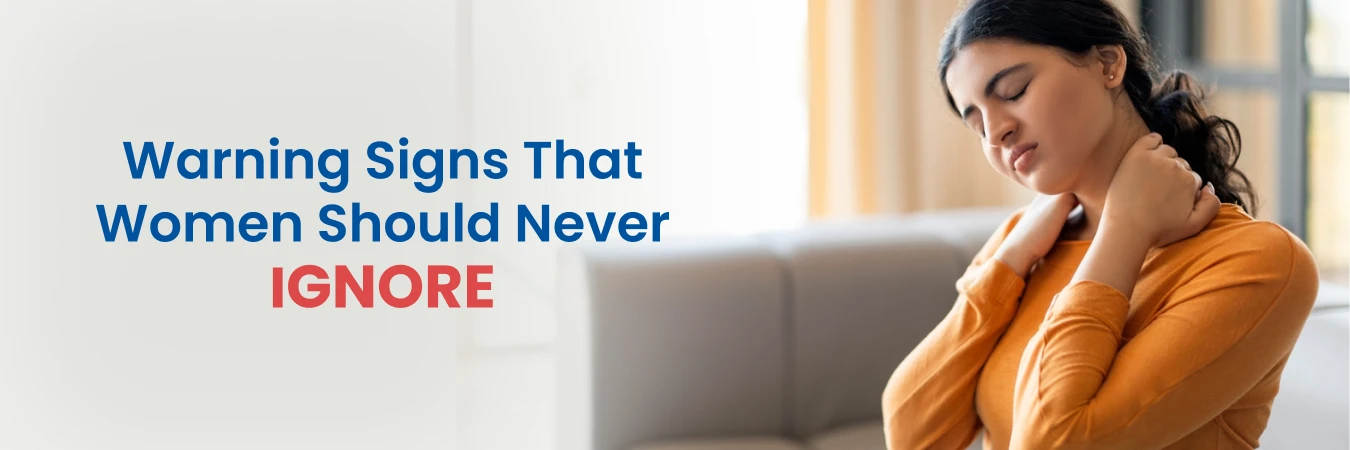- Cardiology 84
- Dermatology 45
- Endocrinology 33
- ENT 16
- Fertility 190
- Gastroenterology 78
- General-Medicine 81
- Gynecology 80
- Hematology 19
- Infectious-Diseases 33
- Neurology 52
- Oncology 34
- Ophthalmology 23
- Orthopedics 69
- Pediatrics 31
- Procedure 23
- Public-Health 144
- Pulmonology 59
- Radiology 8
- Urology 68
- Wellness 161
- Woman-and-child 77

Warning Signs That Women Should Never Ignore
As women strive to excel at home and work, they often neglect their health. Ignoring aches, pains, discomfort, and fatigue can lead to serious health issues later on.
Medical Symptoms That Women Shouldn't Ignore
Constant Fatigue and Tiredness
- Feeling tired occasionally is normal, but persistent fatigue can indicate underlying health issues. Fatigue might be a sign of an underactive thyroid gland, known as hypothyroidism.
- This condition can cause weight gain, sensitivity to cold, dry skin and hair, and muscle aches.
- Other medical conditions linked to fatigue include depression, liver failure, anemia, cancer, kidney failure, cardiovascular disease, thyroid disease, sleep apnea, and diabetes.
Chest Pain or Discomfort
- Never ignore chest pain or discomfort, as it can indicate heart disease. Women are often diagnosed with coronary artery disease later in life than men.
- Before menopause, the female hormone estrogen helps maintain good high-density lipoprotein (HDL) cholesterol levels, essential for cardiovascular health.
- After menopause, estrogen levels drop, increasing the risk of heart disease. Along with chest pain, if you experience weakness, hot flashes, shortness of breath, cold sweats, or pain in the left arm or shoulder, see a doctor immediately.
Secure your health with a second opinion. Make informed decisions and book your appointment today!
Get A Second OpinionSuspicious Lump
- Never disregard a lump, but don't panic either, as most breast lumps are not cancerous.
- They are often caused by fibrocystic changes (related to the menstrual cycle), fibroadenomas (benign tumors), and cysts (fluid-filled sacs that can appear anywhere in the body).
Vaginal Bleeding After Menopause
Any vaginal bleeding after menopause is abnormal and should be checked by a doctor. It can be an early sign of cancer, such as
- Endometrial cancer,
- Uterine sarcoma,
- Cervical cancer, or vaginal cancer.
Other causes include thinning of the uterine lining, uterine fibroids, polyps, uterine lining infection, pelvic trauma, and endometrial hyperplasia. Report any changes in your menstrual cycle, such as heavy bleeding, prolonged bleeding, or bleeding after sex or between periods, to your doctor.
Ready to take control of your health journey? Book your appointment now and start your path towards wellness today!
Book an AppointmentLeg Swelling
- Unexplained leg swelling should be checked by a doctor. Swelling in one leg could signal a blood clot, with other symptoms including skin redness, soreness, and warmth in the affected leg.
- Those at higher risk for blood clots include individuals taking birth control or hormone replacement, those who are obese, or those who have recently traveled.
- Prompt treatment is crucial to prevent the clot from traveling to the lungs, which can cause a potentially deadly pulmonary embolism.
Seven More Symptoms You Shouldn't Ignore
- Change in the appearance of a mole
- Excessive hair loss
- Heart palpitations or feeling like your heart is racing
- Persistent abdominal or pelvic pain
- Severe headache
- Unexplained weight loss
- Unusual bloating
Frequently Asked Questions
Symptoms can include chest discomfort, pain in the neck, jaw, or back, nausea, and lightheadedness, which may differ from men's symptoms.
Signs include sudden confusion, trouble speaking or understanding speech, sudden vision problems, and sudden severe headache.
Signs include bloating, pelvic or abdominal pain, difficulty eating or feeling full quickly, and changes in bowel habits.
Warning signs include a lump in the breast or underarm, changes in breast size or shape, nipple discharge, or skin changes on the breast.
Symptoms can include abnormal vaginal bleeding, pelvic pain, pain during intercourse, and unusual vaginal discharge.
Signs include increased thirst, frequent urination, unexplained weight loss, fatigue, and blurred vision.
Signs include changes in weight, fatigue, hair loss, dry skin, and changes in mood or concentration.
Signs include frequent or painful urination, cloudy or foul-smelling urine, pelvic pain, and fever.

- Cardiology 2132
- Dermatology 168
- Endocrinology 135
- ENT 97
- Fertility 217
- Gastroenterology 232
- General 478
- General-Medicine 1685
- Gynecology 169
- Hematology 85
- Infectious-Diseases 208
- Neurology 207
- Oncology 345
- Ophthalmology 65
- Orthopedics 187
- Pediatrics 83
- Procedure 72
- Public-Health 209
- Pulmonology 126
- Radiology 13
- Second Opinion 311
- Urology 294
- Wellness 600
- Woman-and-child 447
Related Blogs
If you have any questions, please fill out the enquiry form or call us, and we will get back to you promptly.
040-68334455